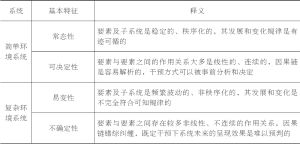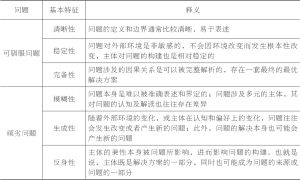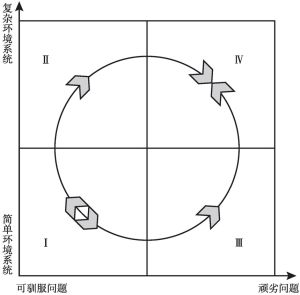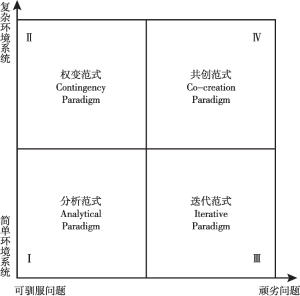论文
剧变时代、顽劣问题与共创
摘要
剧变时代的顽劣问题亟待主体在应对范式上的转变。在全球化、数字化、多元化等引致的剧变时代下,主体(包括个体和组织)在应对许多问题时往往感到无所适从。特别是新冠肺炎疫情的突发与日益常态化,挑战了人们对所处环境系统、所面对问题及其应对范式的基本认知。传统应对范式之所以在面对问题时显得越来越无效,不仅在于其对环境复杂性和问题顽劣性的认知局限,也在于对环境与问题二者的混淆。本文构建了“环境系统-问题”矩阵,并厘清了矩阵中不同象限的问题应对路径,进而在总结出分析范式、权变范式、迭代范式等应对范式的基础上,提出了应对复杂环境下顽劣问题的共创范式,并对其概念体系进行了初步探索。
检索正文关键字
论文目录
- 一 引言
-
二 复杂环境系统与顽劣问题的研究基础
- (一)复杂环境系统的研究基础
- (二)顽劣问题的研究基础
- (三)复杂环境系统与顽劣问题关系的研究基础
-
三 “环境系统-问题”矩阵的构建
- (一)“环境系统-问题”矩阵及其象限特征
- (二)“环境系统-问题”矩阵的应对路径
-
四 “环境系统-问题”矩阵与应对范式
- (一)分析范式
- (二)权变范式
- (三)迭代范式
- (四)共创范式
-
五 共创范式的概念体系初探
- (一)共创范式的基本内涵
- (二)共创范式的实现
- 1.共创前提——汇集多元主体参与
- 2.共创实现的过程要素
- 3.支持共创过程发生的场域
-
六 讨论与展望
- (一)讨论
- 1.理论启示
- 2.实践意义
- (二)研究展望
- (一)讨论
查看更多>>>







